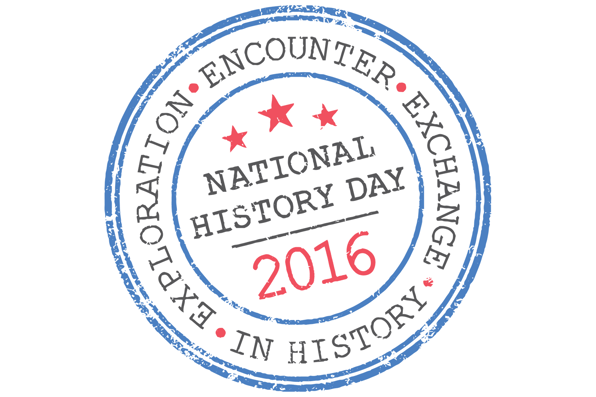
Differentiated Lessons to Gear Students Up for National History Day
With winter break officially over, we've heard from lots of ThinkCERCA teachers about their plans to kick off National History Day projects over the coming weeks. Every year, students across the globe spend months researching, analyzing, and preparing for NHD's annual History Day Contest in June. Although the big contest doesn't happen for a while, local NHD contests and events are kicking off soon. As part of this process, students prepare a final presentation (paper, exhibit, performance, documentary, or website) about a topic of their choosing, as long as it relates to the annual theme. This year's theme is Exploration, Encounter, Exchange in History. According to NHD, "The intentional selection of the theme for NHD is to provide an opportunity for students to push past the antiquated view of history as mere facts and dates and drill down into historical content to develop perspective and understanding."
In addition to the awesome resources and lesson plan materials NHD offers on its website, we've put together a list of our own differentiated close reading and writing lessons to help teachers prepare students for this year's contest:
Sign up for a free account to view these lessons >>
Free Close Reading Lessons
-
Canine Hero: How did Seaman help save the Lewis and Clark expedition? (Grades 3-5; CCSS.CCRA.R.5)
-
Brothers in Spirit, Brothers in Liberation: Who did Nelson Mandela look up to? (Grades 3-5; CCSS.CCRA.R.8)
-
Albina's Cell Phone: How does Internet access change the way small villages around the world work? (Grades 3-5; CCSS.CCRA.R.8)
-
Where Were the Women?: Why did women have a limited role as explorers during the Age of Exploration? (Grades 6-8; CCSS.CCRA.R.2)
-
The Wonders of Ancient Rome: How have people expressed their fascination with Rome throughout history? (Grades 6-8; CCSS.CCRA.R.8)
-
Brazil: A Land of Beauty and Diversity: What is the culture of Brazil like? (Grades 6-8; CCSS.CCRA.R.8)
-
Remaking a Nation: President Mandela: What were the opportunities and challenges of implementing the Truth and Reconciliation Commission after Apartheid ended? (Grades 9-10; CCSS.CCRA.R.8)
-
Young Cesar E. Chavez: What made Cesar Chavez an American hero? (Grades 9-10; CCSS.CCRA.R.5)
-
Made by China in America: Is China's boom good for America's economy? (Grades 9-10; CCSS.CCRA.R.8)
-
Discovering that Christopher Columbus Is Persona Non Grata: How were the Italian immigrants able to overcome the opposition to the creation of a Columbus statue? (Grades 11-12; CCSS.CCRA.R.6)
-
After Expelling Jews in 1492, Spain Considers Inviting Them Back: Why is Spain inviting Jews to apply for citizenship? (Grades 11-12; CCSS.CCRA.R.1)
-
The Foreign Aid Paradox: How do different types of foreign aid impact economic development for givers and receivers? (Grades 11-12; CCSS.CCRA.R.1)
Differentiated Lesson Sets for Grades 4-12
- The Transatlantic Slave Trade: What were the experiences of enslaved people in the transatlantic slave trade?
- Christopher Columbus: What were the causes and effects of Columbus’s voyage to the New World in 1492
- Immigration through Ellis Island: How did individuals’ experiences at Ellis Island both affect their lives and reflect the changes taking place in the United States at the time?
- Jamestown: What actions and events shaped the progress of Jamestown?
- Technology and the 4th Amendment: How does the 4th Amendment protect our rights even as technology changes?
- Mahatma Gandhi: How did Gandhi encourage nonviolence throughout the world through his writings?

Elizabeth Riley Boyer is an experienced journalist, digital content strategist, and operations manager. Prior to joining ThinkCERCA, she was part of the founding team at Impact Engine, Chicago’s first social impact investment fund and accelerator. As Impact Engine’s Director of Operations & Communications, Elizabeth oversaw the company’s overall processes, day-to-day planning and finances, curriculum development, marketing strategy, and community outreach.
Elizabeth also spent three years at Chicago magazine, most recently as its Digital Engagement Editor, where she managed the organization’s social media and reader engagement initiatives. Elizabeth also works as a freelance content strategist, writer, and communications consultant. Her recent writings on impact entrepreneurship have been featured by the Huffington Post and Crain’s Chicago Business.
In 2007, Elizabeth helped open a private school for underprivileged children while volunteering for a nonprofit organization in the Dominican Republic. This experience inspired her to quit a paper-pushing job at an insurance brokerage firm to pursue a master’s degree in journalism from Northwestern University. Elizabeth also holds a bachelor’s degree in American studies from the University of Texas at Austin.
